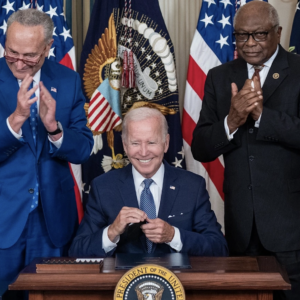It has been a year since Congress passed the Biden administration’s much-ballyhooed multi-billion Inflation Reduction Act (IRA), and inflation remains high.
The new Consumer Price Index, released Thursday, stands at 3.2 percent, with the core CPI at 4 percent. The deficit is $2.3 trillion over last year. And the Congressional Budget Office estimates a $1.6 trillion deficit for the first 10 months of this year, including $221 billion in July alone. If the deficit continues at that pace, the U.S. will add $2 trillion in new debt this fiscal year.
As those new numbers were coming in last week, President Joe Biden acknowledged publicly what economists and critics have been saying all along; The “Inflation Reduction Act” had nothing to do with “inflation.”
“I wish I hadn’t called it that. It has less to do with reducing inflation than it does providing for alternatives that generate economic growth,” Biden said Thursday at a campaign fundraiser in Park City, Utah.
And at a fundraiser in New Mexico earlier in the week, Biden was even more direct.
“It has nothing to do with inflation. It has to do with the $368 billion, the single-largest investment in climate change anywhere in the world, anywhere. No one has ever, ever spent that.”
All of Pennsylvania’s Democrats in Congress voted to pass the IRA, while Bucks County Republican Brian Fitzpatrick joined every member of the GOP and voted against it.
Though Reps. Madeleine Dean (D-Montgomery) and Mary Gay Scanlon (D-Delaware/Philadelphia) attended a White House party celebrating the passage of the IRA’s passage last year, praising its potential to improve people’s lives, they ducked requests to comment from DVJournal last week.
Pennsylvania’s Democratic Sens. Bob Casey and John Fetterman also remained mum.
But Scanlon touted the IRA and another Biden spending bill, the American Rescue Plan, in a newsletter to constituents. She claimed they created 86,800 new jobs and spent $8.9 million for public infrastructure and $1.8 billion for high-speed internet.
“I look forward to continuing to work alongside the Biden administration to make investments in our communities and working-class people to foster an emerging economy,” Scanlon said.
Rep. Chrissy Houlahan (D-Berks/Chester) was out of the country when DVJournal reached out, but her spokesperson shared a July 27 Fox News interview where Houlahan discussed inflation and the economy.
“About a year ago, we put together a plan to deal with inflation,” Houlahan said, adding a lot of the benefits are “coming to fruition, and we are seeing some indications the economy is turning around, and that is good. But we aren’t there yet. And it’s very important that we continue to pursue some of these solutions.”
Shown a video of several consumers complaining about the high prices of groceries and asked about a Fox poll that found 60 percent disapproval of Biden’s handling of the economy, with 45 percent believing they are falling behind in their personal financial situation and 76 percent believing the economy is fair or poor, Houlahan said “two things can be true” at the same time.
Inflation is lower, and consumers are more optimistic, she said. The government is “making sure that people have opportunities to be able to access capital more.”
“We also can see and do see people who are still frustrated, who still feel the pain, possibly in places you’re mentioning like the grocery store. But those two things, as I mentioned, can be true at the same time. And that’s why we need to continue to work on these things.”
Houlahan added, “That’s why things like the economic opportunity agenda are the right steps to be taking in this way.”
Told most voters attributed inflation to massive amounts of government spending, Houlahan pointed out some IRA money is going toward rural access to broadband.
“Those kinds of investments in the future will pay back in dividends for people, and just wait, they’re coming soon to a theater near you,” said Houlahan.
University of Pennsylvania economics professor Petra Todd said increased government spending could lead to inflation, but she also cited the Federal Reserve’s policies.
“The Inflation Reduction Act included provisions to encourage the use of clean energy, reduce pharmaceutical costs and increase tax revenues and cost around 370 billion. Increases in government spending do not usually decrease inflation. In fact, people anticipate that the government might have to print more money to pay for these measures, and therefore increases in government spending can create inflationary pressure,” Todd said.
“Maybe some of the provisions of the Inflation Reduction Act might decrease inflation over the long-term if they eventually decrease energy and health care costs,” she added. “I think the changes we are seeing to the CPI over the short-term are rather tied closely to the activities of the Federal Reserve in terms of setting the interest rate.”
Please follow DVJournal on social media: Twitter@DVJournal or Facebook.com/DelawareValleyJournal

